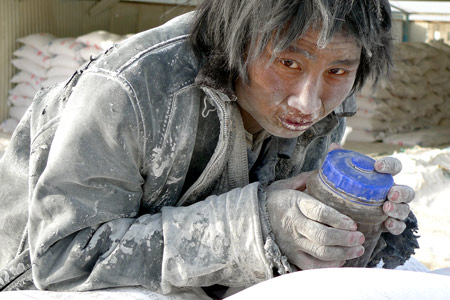Sweatshop allegedly abuses mentally ill
A man in southwest Sichuan Province has been arrested for allegedly selling a dozen laborers, most of whom are mentally ill, to a sweatshop in the northwest Xinjiang Uyghur Autonomous Region, a local official said Monday.
 |
|
A reportedly enslaved Chinese mentally disabled worker is seen at a building-materials factory near Turpan, in the Xinjiang Uygur Autonomous Region, Saturday. |
Local authorities in the city of Dazhou were still investigating the labor abuse case following Zeng Lingquan's detainment, according to Wang Yong, director the Quxian county Civil Affairs Bureau, who also told the Global Times that the workers were sold to a building-materials factory.
"A work group has left for Xinjiang to bring back the laborers," he said Monday.
A total of 11 workers, including eight mentally disabled people, were found to be working in ap-palling conditions at the Jiaersi Green Construction Material Chemical Factory in Toksun county, the Xinjiang Metropolitan newspaper reported.
According to the report, the workers have allegedly been confined to the factory, toiling for at least three years without being paid or given any protective uniforms or equipment. And authori-ties said the workers were forced to live in shabby conditions, not given showers for years and fed the same food as the boss' dogs.
A 40-year-old from Heilongjiang Province, named Wang Li, was among the workers who could communicate relatively well with others. He told the paper that he attempted to escape twice in the past two years, but he was recaptured and badly beaten.
Peng Gengui, another worker, said they were given meat to eat only if they were too weak to work.
Kong Yueyun, 60, who owns a factory that produces marble sandstone close to the Jiaersi factory, speculated on the poor conditions and treatment of the workers. He said he has lived in the town 12 years.
Li Xinlin, owner of the Jiaersi Green factory, told the Xinjiang Metropolitan that his employment of the workers is legal because they were contracted through a disabled persons' aid agency in Quxian county called the Quxian Beggars Adoption Agency, which was founded by Zeng Lingquan.
"Zeng set up the agency and sends workers across the country to allow those people who can't take care of themselves … to make a living on their own," Li told the paper.
According to a contract, shown by Li to the local paper, for five workers transferred as the second batch to the factory, the factory is required to pay the agency a lump-sum of 9,000 yuan ($1,323), plus 300 yuan per month per worker, and to compensate the agency 1,000 yuan for each worker lost. The workers did not receive any pay.
In similar factories, the average daily salary for a worker is at least 150 yuan, and laborers do not need to work between November to March due to cold weather, Kong said.
 0
0 






